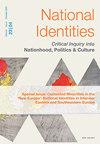Rejection, accommodation, disillusion: the responses of Magyar intellectuals to the unification of Transylvania with Romania
IF 0.7
Q3 POLITICAL SCIENCE
引用次数: 0
Abstract
ABSTRACT This study examines the role of minority identity strategies in Transylvania within the context of competing nationalisms. The case of Magyar communities perfectly illustrates the great complexity of many contested regions after WWI. On the one hand, a substantial number of Transylvanian Hungarians maintained a solid connection with the official revisionist aims of the Hungarian government and showed a fierce and violent refusal to accept the end of historical Hungary. On the other, a minority of Transylvanian Hungarians tried to assume a different perspective of the past and develop new strategies of integration, focusing on the multicultural legacy of Transylvania in order to renew the cultural milieu of the community and offer new responses to changed conditions. This article conducts a historical examination of these responses, analyzing the interwar cultural experience of Magyar intellectuals in relation to categories such as minority rights, regionalism, or national indifference. It concludes that it was not exactly indifference that characterized the fight for the defence of minority rights or ideas such as Transylvanism. This, it is also argued, failed in providing an alternative representation of Transylvanian history and multiculturalism, and was thus unable to break the monopoly of nationalist imaginary.拒绝、迁就、幻灭:马格雅尔知识分子对特兰西瓦尼亚与罗马尼亚统一的回应
摘要本研究考察了在竞争民族主义背景下,特兰西瓦尼亚少数民族身份策略的作用。Magyar社区的案例完美地说明了第一次世界大战后许多有争议地区的巨大复杂性。一方面,大量特兰西瓦尼亚匈牙利人与匈牙利政府的官方修正主义目标保持着牢固的联系,并表现出强烈而暴力的拒绝接受历史上匈牙利的终结。另一方面,少数特兰西瓦尼亚匈牙利人试图从不同的角度看待过去,制定新的融合战略,重点关注特兰西vania的多元文化遗产,以更新社区的文化环境,并对变化的条件做出新的回应。本文对这些回应进行了历史考察,从少数民族权利、区域主义或民族冷漠等类别分析了玛利亚尔知识分子在两次战争之间的文化体验。它的结论是,捍卫少数群体权利或特兰西瓦尼主义等思想的斗争并非完全是漠不关心。也有人认为,这未能提供特兰西瓦尼亚历史和多元文化的替代代表,因此无法打破民族主义想象的垄断。
本文章由计算机程序翻译,如有差异,请以英文原文为准。
求助全文
约1分钟内获得全文
求助全文
来源期刊

NATIONAL IDENTITIES
POLITICAL SCIENCE-
CiteScore
1.70
自引率
0.00%
发文量
37
期刊介绍:
National Identities explores the formation and expression of national identity from antiquity to the present day. It examines the role in forging identity of cultural (language, architecture, music, gender, religion, the media, sport, encounters with "the other" etc.) and political (state forms, wars, boundaries) factors, by examining how these have been shaped and changed over time. The historical significance of "nation"in political and cultural terms is considered in relationship to other important and in some cases countervailing forms of identity such as religion, region, tribe or class. The focus is on identity, rather than on contingent political forms that may express it. The journal is not prescriptive or proscriptive in its approach.
 求助内容:
求助内容: 应助结果提醒方式:
应助结果提醒方式:


